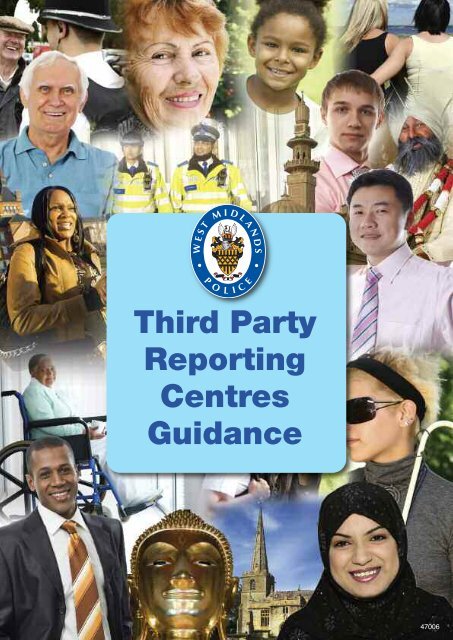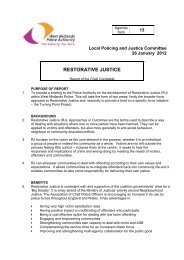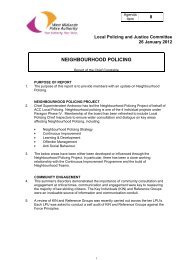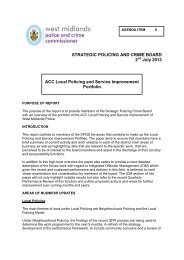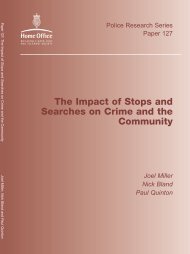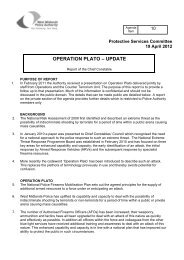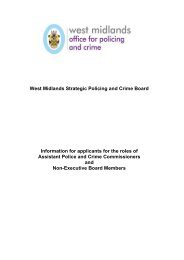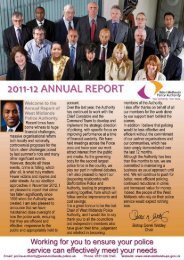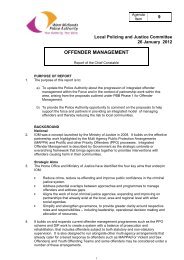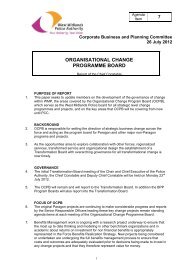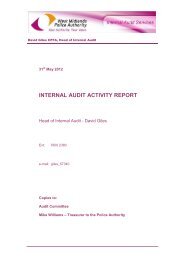Third Party Reporting Centres Guidance - West Midlands Police and ...
Third Party Reporting Centres Guidance - West Midlands Police and ...
Third Party Reporting Centres Guidance - West Midlands Police and ...
- No tags were found...
You also want an ePaper? Increase the reach of your titles
YUMPU automatically turns print PDFs into web optimized ePapers that Google loves.
<strong>Third</strong> <strong>Party</strong><strong>Reporting</strong><strong>Centres</strong><strong>Guidance</strong>47006
What is a hate crime?A hate crime is any crime motivated by ill-will or prejudiceagainst:• Disability• Race• Faith or belief• Sexual orientation• TransgenderLawA hate incident is defined as:“Any incident which may or may not constitute a criminaloffence, which is perceived by the victim or any other person tobe motivated by prejudice or hate”A hate crime is defined as:“Any incident which constitutes a criminal offence, which isperceived by the victim or any other person as being motivatedby prejudice or hate”If an incident goes unreported the offender is free to do thesame thing again to the victim or someone else. There is noexcuse for any form of hate crime – it is not acceptable. Whenincidents occur victims must have the confidence to reportthem knowing they will receive a high level of service from thepolice <strong>and</strong> other agencies.Examples of hate occurrences“Anything motivated by hate or prejudice”• Physical abuse – spitting, punching, kicking leading tophysical injury• Threats – words of a threatening nature [“I’m going to getyou”], threats of violence or assault• Written/verbal abuse – name calling, swearing, makingabusive remarks• Written/printed – letters, leaflets, abusive text• Graffiti – eg disability hate language or images• Attacks on property/home – stones thrown, brokenwindows, v<strong>and</strong>alism.• Harassment
The roles <strong>and</strong> responsibilities of third partyreporting centres1. <strong>Third</strong> party staff will assess the client’s needs in terms ofaccess to service <strong>and</strong> reasonable adjustments. Where thereis specific concern around victim vulnerability, it is theresponsibility of the third party staff to notify the police<strong>and</strong>/or other required agencies as soon as possible in orderto ensure that the appropriate support is provided to theclient.2. Establish whether a hate crime or hate incident has beencommitted. This can be achieved by:• Asking the victim to describe what exactly has happened• Asking the victim how they feel about the incident• Asking the victim why they feel they have been targeted• Asking them if they have reported it to the police or anyother agency in the past (if so, you will need to record thecrime/log number given by the agency. This can beattached to the new referral later)3. Once third party staff are aware of the victim’scircumstances, they may use the definition guide above toestablish the hate category.4. <strong>Third</strong> party centre staff will provide the victim with anopportunity to complete the form while at the centre. Note:assistance in completing the form may be offered to thevictim, for example interpretation of the questions orassistance in writing the answers (if applicable).5. A member of staff can highlight the online reporting formthrough True Vision <strong>and</strong> offer support or an explanation ifrequested.6. Once the appropriate recording form is complete, third partycentre staff will provide a copy of the form to the victim.7. Once the form has been completed this will then be receivedby True Vision, who will allocate the complaint to the policeforce responsible for your area.8. If a disability hate crime form is completed this can bedelivered to any police station for referral.9. A completed form must be filed within secured storage <strong>and</strong>kept on record as per data h<strong>and</strong>ling protocols.10. <strong>Third</strong> party reporting staff may become a point of contactfor the victim at a later date if required.
• In partnership with <strong>West</strong> <strong>Midl<strong>and</strong>s</strong> <strong>Police</strong>, update <strong>and</strong> clarifywith the victim what would happen after the victim submits aTrue Vision report <strong>and</strong> ensure the victim fully underst<strong>and</strong>s theprocess.• Note the reference number (if applicable) <strong>and</strong> provide this tothe victim.• Ensure every effort is made to assist the designated policeofficer in their h<strong>and</strong>ling of the new referral.• Accept that they may become a regular point of contact forthe victim if required.What is True VisionTrue VisionThis online reporting facility has been designed <strong>and</strong> developedby the Association of Chief <strong>Police</strong> Officers. Its fundamentalfunction is to allow victims to report incidents directly online,either by self referral or through the aid of staff at third partyhate crime reporting centre.Victims may also specify how they want to be contacted <strong>and</strong> ifcontacting them would cause you or them any difficulties. Thisnotion takes away the initial concerns some victims may havewhen it comes to actual reporting directly to the police.The principles behind True Vision reporting allow anopportunity for the victim to report hate crime online <strong>and</strong>anonymously if they wish.See link: www.report-it.org.ukSuccessfully challenging hate occurrences/incidents is alsoempowering for local organisations. By being effective in ourjoint efforts, local people will develop increased confidence inthird party reporting centres <strong>and</strong> the force which may lead togreater interaction <strong>and</strong> trust.


